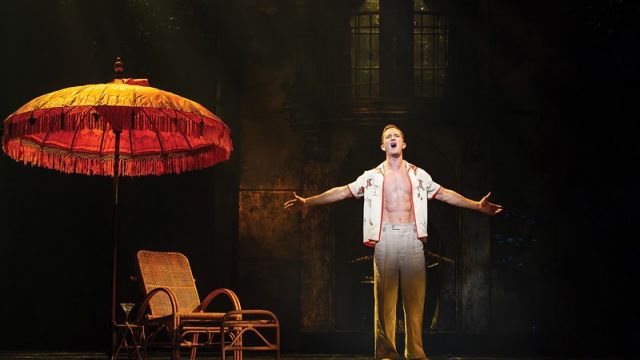A Toast to Tim Draxl
With Tim Draxl on stage in his biggest musical theatre challenge to date, the role of Joe Gillis in Sunset Boulevard opposite Sarah Brightman, Les Solomon – his former manager - reflects on the actor-singer’s brilliant career.
Tim Draxl’s mother, during a low point in his life, reminded him that he was given a gift, and he needed to continue to use it (pictured below). That gift as a major Australian and international actor/singer/film star/entertainer has been on display for almost thirty years.
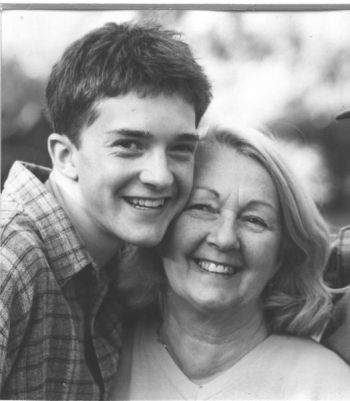
I have known Tim since he was 16 years old, performing as Tom in a production of Away at McDonald College, the acclaimed performing arts high school in Strathfield NSW. From the very beginning, Tim showed incredible versatility, honesty and unique vulnerability. It is these features that have kept his career buoyant ever since.
Tim made a further impression while still at school by playing the title role in McDonald College’s production of The Life and Adventures of Nicholas Nickleby, which was so acclaimed that the Seaborn, Broughton & Walford Foundation produced a five-night season at the Independent Theatre.
From that moment, it seems, Tim has never been out of work. His unique ability as a singer - a dramatic interpreter of lyrics - started him off and less than six months later (at 17!!) he had a contract with Sony Music, who began to produce his first album.
Acting as his manager, I remember the next few years were a blur of endless activity – a trip to New York, a season at Eighty-Eights, the famous intimate NYC cabaret venue. Within a very short period Tim was nominated for, and consequently won, “Best New Talent” at the esteemed MAC (Manhattan Association of Cabaret) awards - presented to him by Liza Minnelli. A picture of Liza and Tim appeared on the front page of The Sydney Morning Herald the next day.
From that point, Tim’s career just took another step forward. We all know the best way to get noticed in Australia is to get international recognition, so he was offered the role of Rolf in The Sound of Music with Lisa McCune and John Waters.
So, it went on. Another CD was in the works, which turned into a superior project as it was musically directed by the late great Peter Matz. Matz had been the long-time MD for Barbra Streisand and his past associations included Frank Sinatra, Marlene Dietrich and Judy Garland. His reputation was legendary, and Tim recorded that second album in the hallowed halls of Capitol Records in LA with many of the musicians who had worked with Matz on recordings by those musical legends.
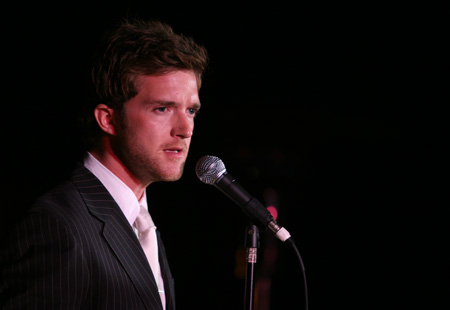
It turned out to be Matz’s last completed album, a memory of which Tim is very proud. Soon he was a guest on the Rosie O’Donnell Show promoting his CDs - the world was at his feet.
Around this time Tim recalls an agent who suggested he needed to broaden his horizons to film and stop performing live.
“I don’t agree with that advice today,” Tim says. “I have grown to realise, as Barbra Streisand said in the song ‘Where is it Written’, that there should be no restrictions to where one’s talent should go.”
Yet at the time Tim did listen to the advice and gave up singing for four years, which, it seems, has helped him today to have the unique ability (for Australia) to move seamlessly between film, TV, music theatre, cabaret and recording.
During that time Tim lived in LA and made a series of movies. He talks fondly of famous American casting director Mali Finn (who cast the 1997 hit film Titanic).
“Mali was a great champion of mine,” says Tim. “She helped me achieve so much in those years.”
Finn originally pursued him through the many rave reviews his cabaret shows gathered in New York and tried to cast him in the Michael Douglas film The Wonder Boys.
He lost that role to Tobey McGuire, but what followed was series of small budget but well-regarded films, the most memorable being Ivory, in which he co-starred with Martin Landau, Peter Stormare and Travis Fimmel. Playing the leading role of a talented pianist, it was supposed to be the big international role that would launch Tim’s movie career.
Unfortunately, it failed at the box office, owing to production issues, with its release in Australia limited to DVD.
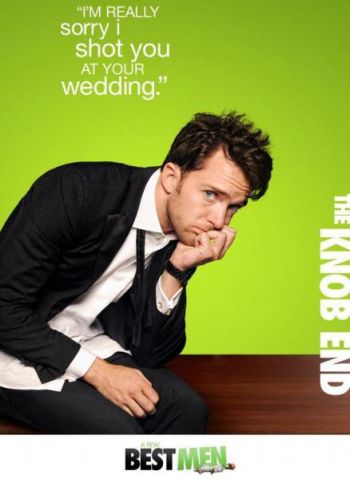 Yet Tim’s movie career since he returned to Australia has been busy – he co-starred with Geoffrey Rush and Judy Davis in Swimming Upstream, with Olivia Newton-John in A Few Best Men, played the lead in the ABC mini-series The Shark Net and several other movies of that era, most notably Travelling Light with Heather Mitchell.
Yet Tim’s movie career since he returned to Australia has been busy – he co-starred with Geoffrey Rush and Judy Davis in Swimming Upstream, with Olivia Newton-John in A Few Best Men, played the lead in the ABC mini-series The Shark Net and several other movies of that era, most notably Travelling Light with Heather Mitchell.
“It took me four years to return to cabaret,” says Tim, “yet when I did it was so fulfilling.”
He had a short season at El Rocco Café and Theatre in Sydney which kept being extended. This resulted in his taking the show Back for Seconds to New York, where critics acclaimed him all over again. Next magazine wrote that “Tim Draxl is a star whose time has come.”
It has been an illustrious career as he has continued to move between all the mediums, including theatre roles with Belvoir St, Griffin, the Hayes and the Ensemble.
In recent years Tim’s four season lead in Foxtel’s A Place to Call Home won him a whole new audience and this year he was nominated for two AACTA awards for his work in the miniseries In Our Blood and Erotic Stories. In the last two years Tim has also had great music theatre success, with his leading roles in Jagged Little Pill and Belvoir’s Into the Woods.
One of his most notable cabaret shows was a tribute to Chet Baker. The show that flowed from that - Freeway - gave Tim his Opera House debut.
The former arts editor of the Sydney Morning Herald, Bryce Hallett, recalls the show which he and I created with Tim.
Bryce says, “The thing I loved about Freeway is that it brought into play Tim’s skill and resourcefulness as an actor, and his smooth, silky vocals. He is by far one of finest interpreters of Chet Baker repertoire you are likely to find. Tim has developed into a hugely gifted performer, full of purity and passion. He’ll be brilliant as Joe Gillis."
So, to Sunset Boulevard. Tim says working on the show has been one of the highlights of his career.
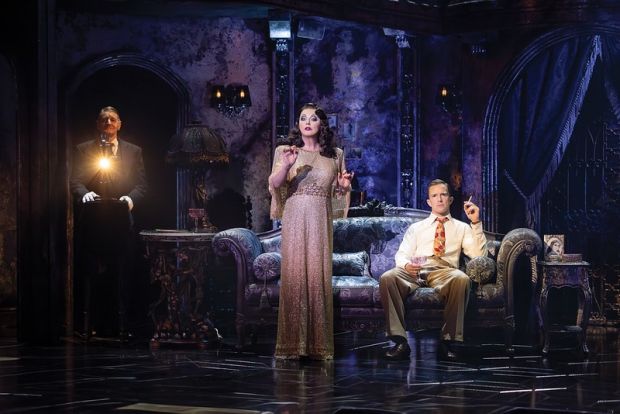
“I am such an introvert, that the way I express myself is through my work and someone else’s words. Sunset gives me the opportunity to bring all the skills I’ve learnt and been working on for so many years together. It’s the perfect culmination of everything. The movie is one of my all-time favourites, so to bring ‘Joe’ to audiences is extraordinary. I’ve never worked so hard, but it’s worth every minute.”
Tim Draxl is the ultimate Australian superstar, adored and admired internationally and locally. He brings a rare ability to investigate lyrics in a song. This has been his skill since he was 16. Sunset Boulevard, has proven to be another triumph in a career already packed with success and praise.
Sunset Boulevard’s Love Triangle
Tim Draxl’s character Joe becomes enmeshed in a love triangle with Norma (Sarah Brightman) and Betty (Ashleigh Rubenach). When David Spicer caught up with Ashleigh, she was rehearsing for Sunset Boulevard by day and performing in Groundhog Day the Musical by night.
David Spicer: What's fresh about this production of Sunset Boulevard?
Ashleigh Rubenach: Usually in Australia we stage a replica production from overseas that already has all the blocking and everything in place. We're doing a brand-new version of Sunset Boulevard, with a whole new set and costume design.
DS: Can you describe it a little for us?
AR: We're leaning into the classic Sunset Boulevard that people will know and love. We're honouring the style and grandeur of the original show but with a few tricks up our sleeve.
DS: So, a grand look of old Hollywood?
AR: It’s definitely in the old Hollywood style - expect a huge set design, with incredible 1940s costuming.
DS: Is there anything you particularly like about the new production?
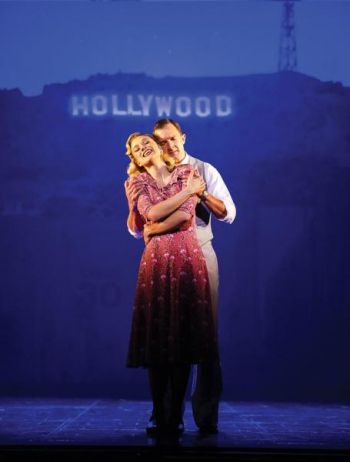
AR: I'm enjoying the experience as an actor to be able to discover who my Betty Schaefer is and be able to make decisions about where and how I move.
DS: Tell us about your character.
AR: Betty is a reader in the script reading room at Paramount Studios. She's quite a revolutionary woman for her time and she speaks her mind, which catches the attention of the writer Joe Gillis, who is at the centre of our story. Betty represents the hopeful ambition of Hollywood.
DS: So, what's your relationship to the central character of Norma?
AR: Well, unbeknownst to my character, Joe gets caught up in a bit of a love triangle with Betty and Norma and then becomes a pawn in her scheme.
DS: What is the age difference?
AR: Norma, being a star of the silent film era, is around her 50s while Betty says she's 22.
DS: So, Norma wouldn’t like Betty very much?
AR: No, not a fan.
DS: How do the sparks been fly between Sarah Brightman’s Norma and your character?
AR: On the studio floor, when we're Betty and Norma, all of the unnecessary drama is there. Sarah as a performer brings so much heart and vulnerability to what she does. But the second we're off the studio, Sarah Brightman is an absolute delight and has such a beautiful English accent. As someone who grew up listening to The Phantom of the Opera, it’s pretty mind-blowing to be working with the person Christine was written for.
DS: Has she dropped any pearls of wisdom that you've learned from?
AR: The fact that I'm performing in Groundhog Day the Musical concurrently means I'm rushing off to the theatre every time we’re off the rehearsal floor, but I'm looking forward to having more opportunities to chat.
DS: How did you cope doing two shows at once?
AR: I am working pretty hard, and there are long days, but I am finding similarities and differences between the two characters. That’s been really fascinating.
DS: What are those differences?
AR: The character of Nancy (In Groundhog Day the Musical) is a woman in contemporary times in in America. Then on the opposite end of the spectrum, you have Betty Schaefer, who was around in the 1940s when there was an expectation of women behaving in a certain way. But she has no filter and she speaks her mind. I think that's so exciting and refreshing too, to see that kind of dichotomy of being a woman from both perspectives, and how the characters in each of those shows react to those women speaking their mind.
DS: Les Solomon notes that Tim Draxl is one of the rare musical actors who also has a career in film and television. Do you agree that it's difficult to traverse both fields?
AR: Yeah, I do. There does seem to be a bit of a separation. I think it's exciting when you have actors - Hugh Jackman is a perfect example - who manage both mediums.
Film and TV is something that I've always been interested in. I've been very fortunate up to this point to be a little bit busy.
Tim Draxl is another perfect example of someone who's managed to traverse both, so I'm excited to pick his brain.
DS: How do you find working with Tim?
AR: Tim is an absolute legend I adore him. He's such a present and reactive actor and a real delight to work.
DS: And a nice person be involved in a (theatrical) love triangle with?
AR: I'm very, very lucky.
Princess Theatre, Melbourne, until August 10 2024
Sydney Opera House from August 28, 2024
Production images by Daniel Boud
Subscribe to our E-Newsletter, buy our latest print edition or find a Performing Arts book at Book Nook.

